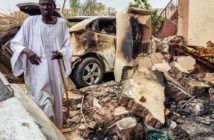To watch the children die…
Shootings in Paris, in Orlando, devastating explosions in the airports of Brussels and Istanbul… The current affairs of the Arab world focus on the Western world.
The wars of Iraq, Syria and Libya –at one time present in the European minds– move further away and are lost once again in the fog of indifference. The relentless repetition of terror attacks in Egypt, in Tunisia, in Lebanon, or in Mali – a country no longer on the radar of the media, although the situation there grows worryingly out of the hands of the UN forces… this global marasmus… which contributes to becoming used to those omnipresent dramas, whose mentioning in the newspaper is now boring the readers. Boring in the same way as the migrants flocking to Europe… They made the headlines during many weeks. Now, the refugees are still as numerous to stand in line at the borders of Europe; they are still there, crowded in camps… but they are not mentioned anymore. Also forgotten…
In this generalised chaos that has been finding its way to normality over the last five years and that is desolating the Arabic Orient, another war, another destructive conflict is also absent and not heard of: Yemen.
If one was to do a quick survey on the streets of London, Paris, Brussels or even in Istanbul, nobody would be able to describe in a few words the depraving humanitarian situation in Yemen, in Sanaa, its capital, in Aden, further south, everywhere… The few NGO volunteers that have not yet left the country, despite the heightened security risks, find themselves unequipped, overwhelmed by the masses of displaced people and the collateral victims of the conflict.
Since the strange “revolution” resembling a war of chiefs, that had emerged in Yemen in 2011, followed by strange elections in February 2012, a humoristic vote for the only candidate, President Abdu Rabu Mansour Hadi, Yemen has plunged into an inextricable civil war that was immediately dubbed by a proxy war opposing the very Shi’ite Iran to the very Sunni Saudi Arabia.
Thence, in the ignorant euphoria of an “Arab Spring”, the international (aka Western) press had declared the story as settled and celebrated the coming of democracy in Yemen, as it did for Tunisia, Libya and Egypt… some rare observers, especially those present on the ground, shouted truths into the desert…
In 2011, there was actually no “revolution” in Yemen. There was a cock fight that has rapidly submerged the few velleities of a handful of students of the University of Sanaa, inspired by the events in Tunis and Cairo.
The stake involved was never democracy, but the succession of President Ali Abdallah Saleh, who himself destined his son to be his successor, although he had already promised it to his half-brother, General Ali Moshen, head of one part of the army and who used the students’ uprising to dethrone his kinsman.
A family quarrel that turned to war and made the bullets fly across the streets of Sanaa; and to which other factions added themselves, profiting from a weakened and bankrupt government: the powerful tribal coalition of the al-Ahmar clan, unsurprisingly keen to get control of the meagre petrol resources of the country; the separatists in the South, always ready and decided to ‘talk’ about the agreement of 1990 that had united the two Yemens; the thousands of al-Qaeda fighters, in the East, that controlled entire provinces (which they control even better nowadays); and the Shi’ite rebels in the North, the Houthis, sickened by the corruption of the political class of Sanaa.
Riyadh saw the fragile stability it had imposed on its neighbour and quasi-protectorate since decades threatened and forced a peace deal among the chiefs. A forced agreement is never respected.
Within its framework of regional political influence, Iran supported the Houthi opposition, which managed to seize the capital in 2015, forcing President Abdu Rabu Mansour to flee to Aden… and the Saudis, reacted by assembling a Sunni coalition to launch an anti-Shi’ite crusade in Yemen, pitiless, whose intense shelling ruined what was left of this country that already before the war was one of the poorest ones on this planet.
Since then, waves of talks eternalise themselves between the different factions, without the hostilities taking end… Saleh is allied to the Houthis against his old friend Mansour, who took refuge in Arabia after the invasion of Aden… Al-Qaeda gained ground, to the point of worrying the border patrol guards of the Sultanate of Oman. And Yemen, slowly but surely, adds itself to the growing list of “failed States”, below Libya, Syria and Iraq.
In Yemen, there is no longer any medical infrastructure to welcome the desperate people, abandoned to themselves; there is no more food to feed them; no more medicine … there is nothing else left to do than to watch the children die.



